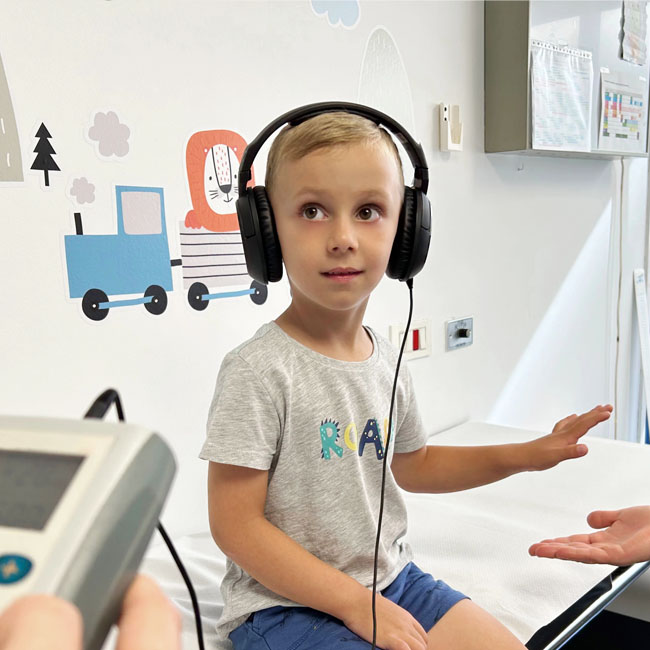Accurate and thorough hearing assessments to identify and understand your unique hearing needs.
Diagnostic Hearing Assessment
Comprehensive Hearing Evaluation
Understanding your hearing health is the first step toward better communication and quality of life. A comprehensive hearing evaluation involves a series of advanced tests and assessments to accurately diagnose any hearing issues and create a tailored treatment plan.
- Provides insights into your overall auditory health.
- Identifies potential causes of hearing difficulties.
- Helps detect conditions affecting the outer, middle, or inner ear.
- Guides the development of personalised hearing solutions.

Detailed Hearing Assessment
A thorough hearing assessment involves a series of specialised tests to evaluate different aspects of your auditory system. These evaluations help pinpoint the cause of hearing difficulties and guide the development of an effective treatment plan tailored to your needs. Below are the key components of a comprehensive hearing assessment:
Case History
The audiologist will ask the patient about their medical history, any medications they are taking, and any symptoms they are experiencing related to their hearing.
Physical Examination
The audiologist will examine the patient’s ears to look for any physical abnormalities or signs of infection.
Pure-Tone Audiometry
This is a test that measures the softest sounds a person can hear at different frequencies (pitches). The patient wears headphones and listens to a series of tones played at different frequencies and volumes.
Speech Audiometry
This test measures how well the patient can hear and understand speech. The patient may be asked to repeat words or sentences at different volumes and in different background noise levels.
Tympanometry
This test measures the movement of the eardrum in response to changes in air pressure. It can help diagnose conditions that affect the middle ear, such as fluid buildup or a perforated eardrum.
Acoustic Reflex Testing
This test measures the sound pathway from the inner ear to the brainstem. It can help diagnose conditions that affect the inner ear, such as sensorineural or retro-cochlear hearing loss.
Speech in Noise
This test measures your ability to understand speech in a noisy environment similar to when a patient is out with friends in a noisy environment.
Otoacoustic Emissions (OAE)
This test measures sound waves generated in the inner ear (cochlea). It is used to assess the function of the outer hair cells in the cochlea, often useful for detecting early stages of hearing loss.

Benefits of Diagnostic Hearing Assessments
A diagnostic hearing assessment offers valuable insights into your auditory health, helping to improve your quality of life. Here are some key benefits:
- Early Detection: Identifies hearing issues and underlying conditions at an early stage, allowing timely intervention.
- Customised Solutions: Helps audiologists create personalised treatment plans tailored to your specific needs.
- Improved Communication: Enhances your ability to hear and understand speech, especially in challenging environments.
- Holistic Ear Health: Evaluates the overall health of your auditory system, including the outer, middle, and inner ear.
FAQs About Diagnostic Hearing Assessment
Learn about diagnostic hearing assessments, what they involve, their importance, and how they help identify and manage hearing-related issues effectively.
What does a diagnostic hearing assessment involve?
A diagnostic hearing assessment includes a series of tests to evaluate your hearing ability, examine the ear’s structure, and identify any potential issues affecting your auditory system.
Why do I need a diagnostic hearing assessment?
This assessment helps detect hearing loss, identify its cause, and determine the severity. It also guides the development of an effective treatment or management plan.
How long does a diagnostic hearing assessment take?
The assessment typically takes 30 to 60 minutes, depending on the tests required and the complexity of your hearing concerns.
What should I expect during the assessment?
You can expect a case history discussion, a physical ear examination, and tests such as pure-tone audiometry, speech audiometry, and tympanometry to assess different aspects of your hearing.
Do I need to prepare for a hearing assessment?
No special preparation is needed, but it’s helpful to bring details of your medical history, medications, and any recent symptoms to share with the audiologist.
Get In Touch
We’d love to hear from you! Whether you have questions, need more information, or are ready to schedule a consultation, our team is here to help.
Please complete the form to schedule an appointment or submit an enquiry.
Our Clinics
We proudly offer services across multiple convenient locations to ensure accessible and professional ear care for everyone.
Operating Hours:
-
Monday – Friday: 9am – 5:00pm
-
Saturday: 9am – 4pm
-
Sunday: Closed


